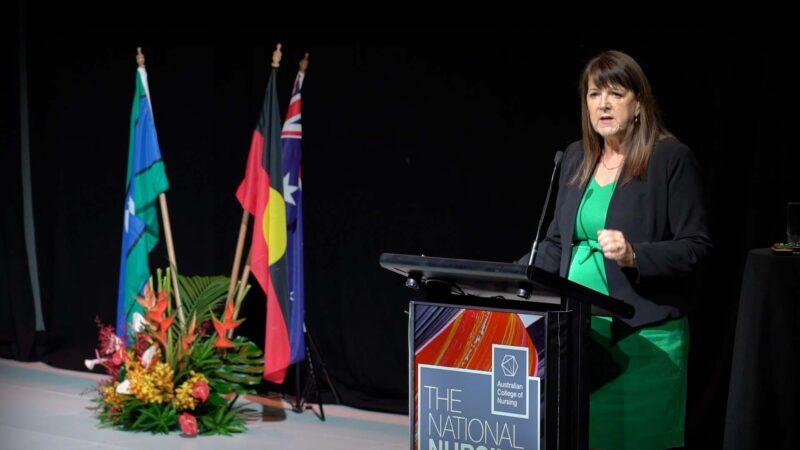FULLY FUNDED TERTIARY QUALIFICATION LAUNCHES TO ADDRESS PERINATAL MENTAL HEALTH CLINICIAN SHORTAGE IN AUSTRALIAN-FIRST Tertiary qualification launched by Gidget Foundation and Federation University.
With Arabella Gibson, CEO
Gidget Foundation Australia
SEGMENT
Filmed in North Sydney | January 2025
Demand for perinatal mental health services is continuing to surge year-on-year. In fact, perinatal mental health organisation, Gidget Foundation Australia (GFA), has supported 30% more clients in FY2024 than in FY2023, up by 214% since FY2021.
Perinatal depression and anxiety (PNDA) impacts 100,000 Australians each year, equating to one in five mums and one in ten dads, with PNDA costing Australia $877 million annually. To address the nationwide shortage of specialist perinatal mental health clinicians, Gidget Foundation Australia has partnered with Federation University to launch the Graduate Diploma in Perinatal Mental Health.
Australian Health Journal met with Arabella Gibson, CEO Gidget Foundation Australia following the announcement to hear about the Gidget mission and the new initiative to address the perinatal mental health clinician shortage.
The new Graduate Diploma in Perinatal Mental Health creates a unique offering in the industry, providing comprehensive ‘on the job’ training, weekly supervision for clinicians, academic modules and a paid placement opportunity as well as ongoing employment through Gidget Foundation Australia’s face-to-face or telehealth services.
The new partnership, create an Australian-first offering of a fully supported tertiary qualification. Gidget Foundation Australia and Federation University have engaged in the unique co-design and co-delivery of the qualification, with both organisations developing and delivering practical and theoretical course content.
Ms Gibson says the Gidget Foundation, with Federation University, is committed to ensuring robust clinical standards are achieved through providing exceptional education for clinicians working in the perinatal space.
“We’ve seen demand for perinatal depression and anxiety support continue to rise, our clinicians supported 30% more clients in FY2024 than in FY2023. It’s essential we have enough qualified clinicians to meet this growing demand to address the critical needs of the individuals impacted.
“Equity, access, and affordability can be a barrier for allied health professionals to further extend their professional knowledge and skills. The Graduate Diploma in Perinatal Mental Health enables health professionals to upskill in perinatal and infant mental health and creates an accessible pathway to enhance knowledge and experience across the sector; whilst benefitting the health professional, clients, and the wider community.”, says Ms Gibson.
The first cohort of the new Graduate Diploma in Perinatal Mental Health will graduate in July 2025 and applications opened in November 2024 for the February 2025 intake.
You Might also like
-
Maximising benefits, minimising harms in population health screening
Population screening is an important contributor to advancing health outcomes through the early detection of and successful intervention for chronic disease. The evolution of science, technology and evidence relating to diseases which are or may be amenable to a population screening approach deserve broad discussion and the sharing of expertise and evidence. They also warrant close scrutiny in context of health policy and health resource allocation considerations.
In March, Public Health Association of Australia (PHAA) convened Screening Conference Conference 2025 with the theme of ‘Population Screening for Chronic Disease – Maximising Benefits, Minimising Harms’.
-
FULL FEATURE Consumers and communities as agents of health care change and improvement
Policymakers, health administrators and clinicians must learn and embrace new ways to harness the transformative role consumers, community members and carers can play. Conversely, consumers and communities need support, capability and capacity to engage as equals in policy, research, program and service design. This is necessary if are to be less technocratic and realise the vision where all members of society can live the best life possible.
-
Role of the Chief Nursing Officer
Professor Alison McMillan PSM spoke with Australian Health Journal about the role of Chief Nursing and Midwifery Officer at the Australian Government Department of Health and Aged Care.
Alison was appointed as our Chief Nursing and Midwifery Officer in November 2019.
In June 2021 Alison was awarded a Public Service Medal for outstanding public service to driving the Government’s national health response priorities during the COVID-19 pandemic, particularly to infection prevention measures.



